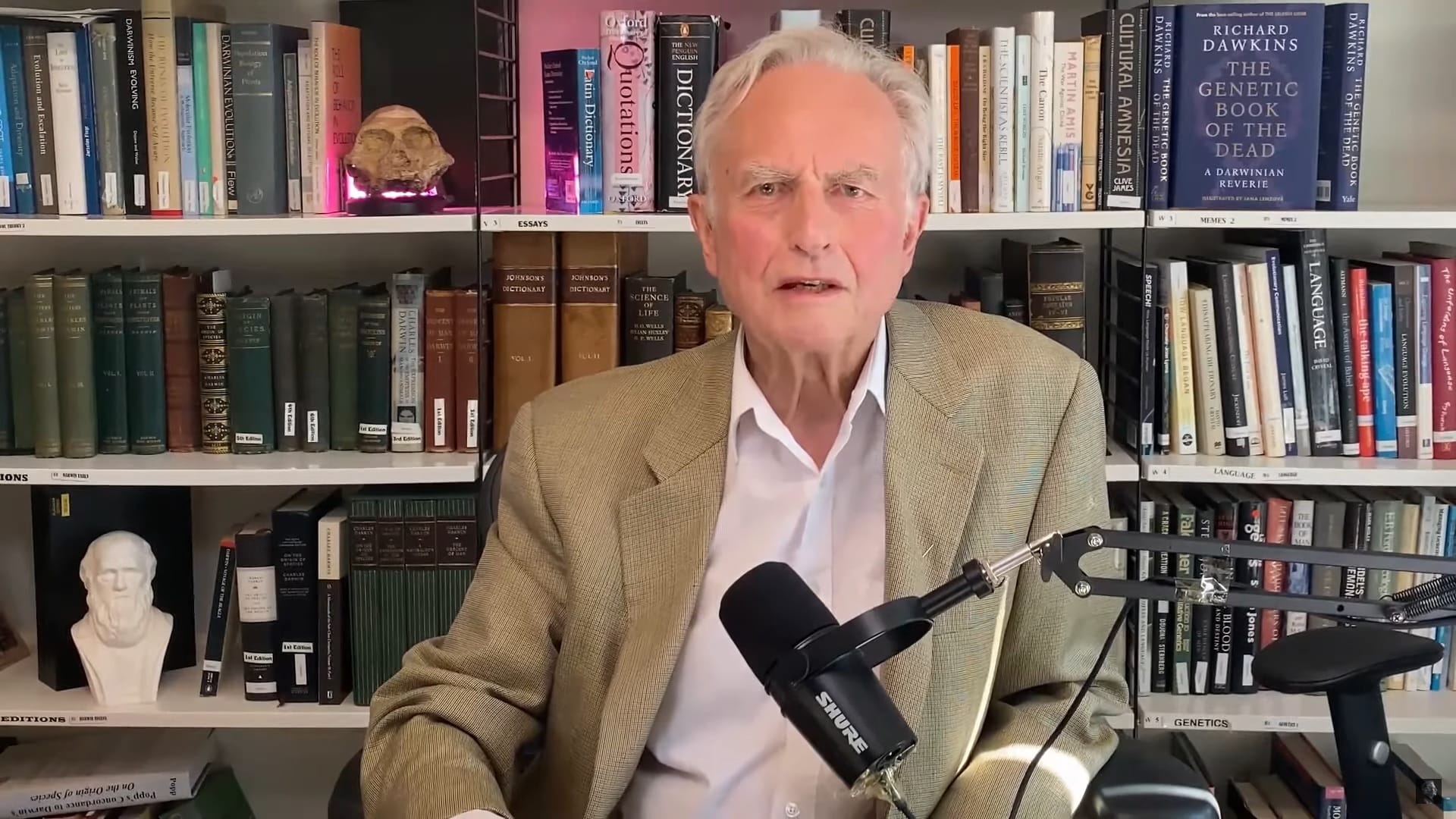Material updated ↓
In August 2024, reports appeared in the media and social networks that the company Meta* blocked the account of a biologist on Facebook* because he wrote about an Algerian athlete in X. We checked how correct such statements are.
August 11 Telegram channel Mash (1.2 million views at the time of writing this analysis) reported (spelling and punctuation preserved. - Ed.): “The famous British popularizer of science and creator of the word “meme” Richard Dawkins was banned from Facebook (recognized as extremist) for calling the transgender boxer from Algeria Iman Khalifa a man in a Mask Hwitter.” The post also contains a tweet from the scientist in which he spoke about the blocking. The same version is presented in the channel’s blog “360"in Zen and on the publication's website News.ru.
A slightly different version of this story is also common. The day before, August 10, in the channel Ateo Breaking (259,000 views) stated that the blocking followed after the scientist called Khelif a man not on the social network X (formerly Twitter), but directly on Facebook. Similar posts appeared in the channels “Nevzorov**" (605,000 views), "Signal"(75,000), "SVTV News – Libertarian media"(72,000) and in some publics in "VKontakte"
However, most publications do not directly indicate on which social network Dawkins wrote about Khelif. This is what the channels didAx Live"(918,000 views), "Ax – Hot news"(254,000), "KB"(251,000), "Dmitry Vasilets"(165,000), "Banksta"(136,000), "Heavenly" (128,000) and "Sheikh Tamir» (125,000), as well as publications Life And "Chalk"
July 29 at 20:50 Moscow time in your profile on social network X Dawkins posted post (already deleted, but it copy remained in the Google cache), in which he shared a link to article far-right site Reduxx with the headline: "Urgent: Two 'boxers' who will compete at the 2024 Paris [Olympics] were previously disqualified from the women's world championships for having an 'XY chromosome.'" Dawkins captioned the link: “Two men posing as women will get the chance to box with real women at the Olympics.” One of the athletes mentioned in the text was the Algerian boxer Iman Khelif (in the screenshot below - left), who became one of most discussed persons of the Paris Olympics, and on August 9 - champion Games
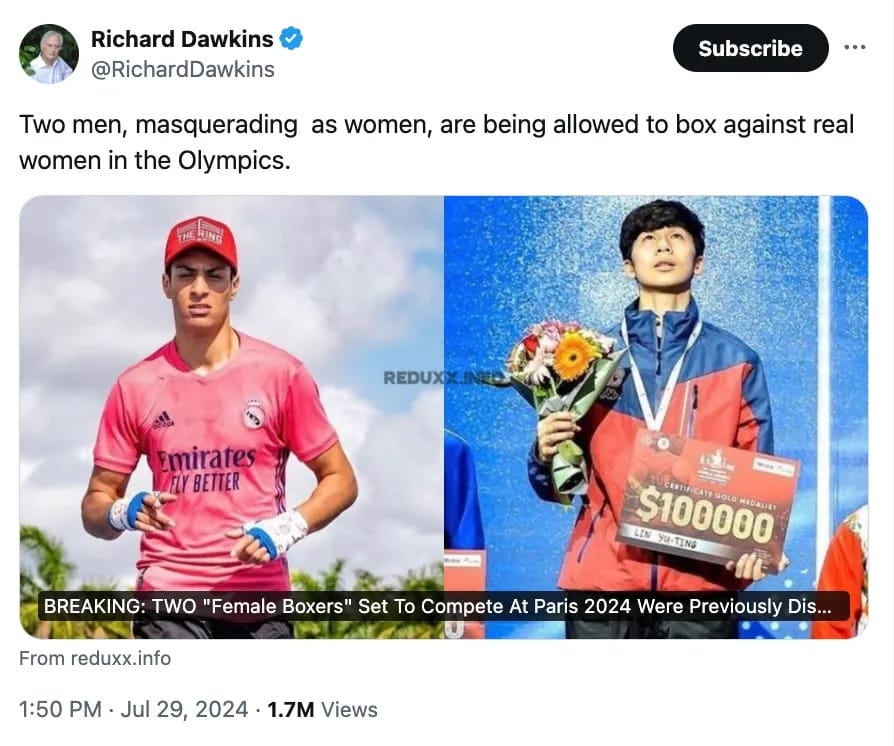
August 2 also on social network X Dawkins complainedthat Facebook blocked his account: “My Facebook page was deleted without any reason and we have not received a response from either Meta or Facebook to resolve the issue. Is it something I said?" The post received more than 110,000 views.
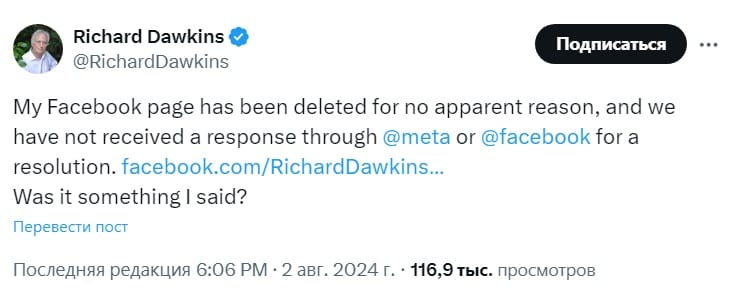
On August 10, the scientist reported in tweet (this post was also deleted, but remains archived copy) that his page is still unavailable: “My Facebook account was completely deleted, apparently (no reason was given to me) because I tweeted that genetic male boxers like Iman Khelif (XY non-negotiable) should not fight women at the Olympics. Of course, my opinion can be discussed in a civilized manner. But outright censorship? This biologist’s publication went viral: according to the archive, before it was deleted, it received at least 19 million views and 9,000 replays. The tweet was also noticed by the owner of social network X, Elon Musk, who reposted Dawkins and wrote: “Wow.” Later billionaire shared another blogger’s post about deleting a scientist’s page and noted: “Facebook, also known as Meta, can never be trusted.”
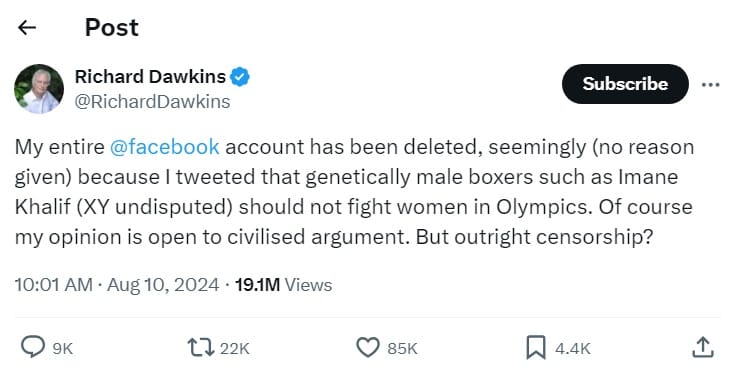
At the time of writing this analysis account Dawkins on Facebook is available. How reports Friendly Atheist website, the scientist’s profile was restored no later than August 11 (by data programmer and blogger Anatoly Voroby, even the day before). “Verified” did not find any posts about Khelif on Dawkins’ Facebook. Of course, the biologist could have deleted the post, as he did with his tweets mentioned above. However, on August 10, Dawkins himself stated that he “tweeted” about the boxer, that is, he wrote on social network X, where such a post was actually published on July 29. So some Russian-language Telegram channels were at least mistaken in where the scientist wrote about the athlete.
Moreover, Dawkins himself did not claim that his Facebook account was blocked specifically because of the tweet about Khelif. So, on August 2, he wrote that he did not know why the profile was deleted, and wondered if some of his statements were the reason. More than a week later, the scientist repeated that he did not know the reason, but suggested that the matter could be in the post about the boxer on social network X. However, could a publication on one social network lead to blocking on another, given that these platforms belong to different companies and they have different moderation rules?
According to a Facebook spokeswoman, she couldn’t. On August 10, when the news about the deletion of Dawkins’ account went viral, she commented on the situation director Meta PR and Communications Dani Lever. “It wasn’t like that at all. Mr. Dawkins' account appears to have been hacked, so we have taken steps to protect it and prevent misuse of the page. This step was taken on July 30. His last post was published on July 25 (at the time of writing this analysis, the last publication was on July 23. - Ed.), even before the start of the Olympic Games, and was not even related to boxing. This action (blocking - editor's note) has nothing to do with the content posted by Mr. Dawkins, and now we are in the process of restoring the page, waiting for it to be protected. While we were focused on ensuring the security of the page, we regret that we were not able to communicate this to the account owner more quickly." stated Lever. On the same day at 22:18 Moscow time she wrote and to the scientist himself: “The removal of your page was a precautionary measure due to signs of potential compromise, and not because of any problems with the content you posted. We are actively working to protect the page and will promptly restore it as soon as we ensure its safety. You may not have been notified in a timely manner while we were focused on protecting your page, and for that we apologize." Meta employee reacted and to Musk’s accusations: “Quite standard operating procedure for Elon: shoot, prepare, aim.”
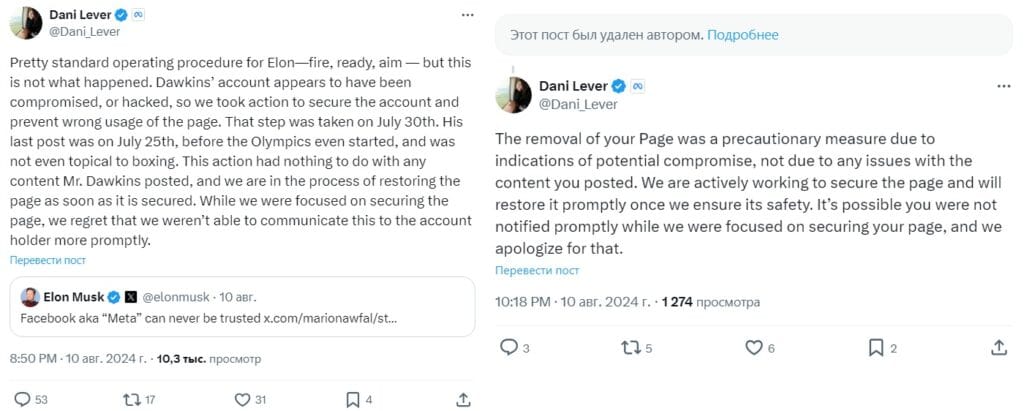
Despite the statements of the Meta representative, the Internet has already come up with more than one version of how a post in X could theoretically influence the deletion of a Facebook page. For example, X users were outraged by Dawkins’ tweet, and then for some reason began sending complaints to his profile on another social network. There is a similar hypothesis: Facebook users saw a screenshot of the scientist’s tweet in their news feeds, found his account and complained to the moderators. There is also a more conspiracy theory: Dawkins’ page was allegedly deleted by one of the Facebook employees due to hostility. However, it is almost impossible to confirm any of the versions, even if one of them is true. The Meta spokeswoman's comment corresponds to a more plausible scenario: the biologist's page was temporarily blocked by the platform's algorithms without proper notification due to suspected hacking, and the situation was resolved due to Dawkins' complaint going viral on X.
You can find more than one example of such a story on the Internet. For example, in March 2023, the Metro newspaper website published article under the headline “Meta deletes Facebook and Instagram accounts of hack victims*, and along with them, years of irreparable memories.” The author of the publication, journalist Lee Bell, specializing in innovation in technology, told how one day he received a notification on Instagram that his account was blocked. It turned out that the problem was with his Facebook profile (both social networks belong to Meta): someone hacked the page and published posts that violated the platform’s rules. At the same time, the journalist’s accounts on two social networks were linked to each other. Despite filing an appeal, Bell was unable to access either Instagram or Facebook for two weeks (although Meta claimed that background checks typically take just over a day). The company ignored requests for comment on his article and instead provided irrelevant information with tips for keeping accounts safe. However, after sending a request to the Meta press service, Bell's Facebook and Instagram pages were restored within 12 hours. “It's kind of a press privilege. But it’s a pity that not everyone who lost their account as a result of hacking can afford the same luxury,” the journalist concluded.
In his article, he talks about the experiences of less fortunate users - for example, the story of a girl from Ireland whose Facebook profile was hacked and blocked. Before the 30-day appeal period expired, she traveled to the company's international headquarters in Dublin and pleaded with staff to help get back the page containing memories of her late father. At the time of writing, attempts to restore access were ongoing. Bell also tells the story of a man whose Facebook account was blocked after being hacked. According to him, he wrote to Facebook and Meta every day via Twitter, but was unsuccessful - after the 30-day period allotted for the appeal, the account was deleted forever. Another hero of the article had his Facebook profile hacked and was permanently deleted along with his Instagram account. Metro readers and numerous users shared similar experiences Reddit. Some of them claim that, like Dawkins, they could not get a response from support or it took a long time. Additionally, it is unknown whether the biologist initially received any notifications from the platform.
Thus, there is no compelling reason to claim that Facebook removed the scientist's page because of his tweet in which he called athlete Iman Khelif a man. Most likely, Dawkins' profile was only temporarily blocked due to a hacking attempt, since complete and irrevocable deletion usually occurs only after 30 days. In this case, before the end of the time allotted for sending the appeal, the page owner must receive notificationthat his account is not visible to other Facebook users and that his profile cannot be used. However, the platform declares, which in some cases does not send a warning before disabling an account.
"Verified" released a detailed text about the Algerian boxer. After her first fight at the Paris Olympics, which Khelif won in less than a minute, the Internet questioned her gender - some media claim that the athlete has a “male” Y chromosome, others call her a transgender and a former man. There is no evidence that Khelif made a transgender transition, that is, it can be argued that she did not consciously change gender during her life. As for the statements about the “male” Y chromosome and about the level of testosterone in the body of an athlete, at the moment they are at least controversial and are based on conflicting data.
*Russian authorities consider Meta Platforms Inc., which owns the social networks Facebook and Instagram, an extremist organization, and its activities in Russia are prohibited.
**Ministry of Justice of the Russian Federation contributed Alexandra Nevzorova to the register of media “foreign agents”, and the Oktyabrsky District Court of St. Petersburg admitted his family by an “extremist association.”
Cover photo: screenshot from video @poetryofreality (YouTube)
Updated August 14, 2024: Added description of other cases where Meta blocked user accounts due to hacking attempts. You can view the previous version of the analysis follow the link.
- Y-man? How the scandal surrounding boxer Iman Khelif developed and how plausible are the claims that she is a man
- Are the footage showing the Olympic Games broadcast on Iranian television true?
- Is it true that Podolyak called the protesting Polish farmers agents of Putin?
If you find a spelling or grammatical error, please let us know by highlighting the error text and clicking Ctrl+Enter.


